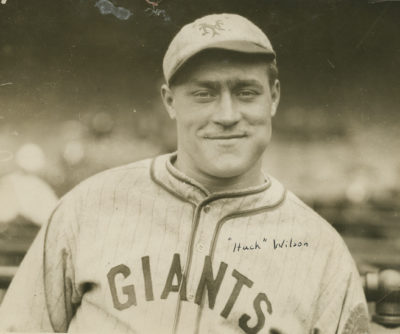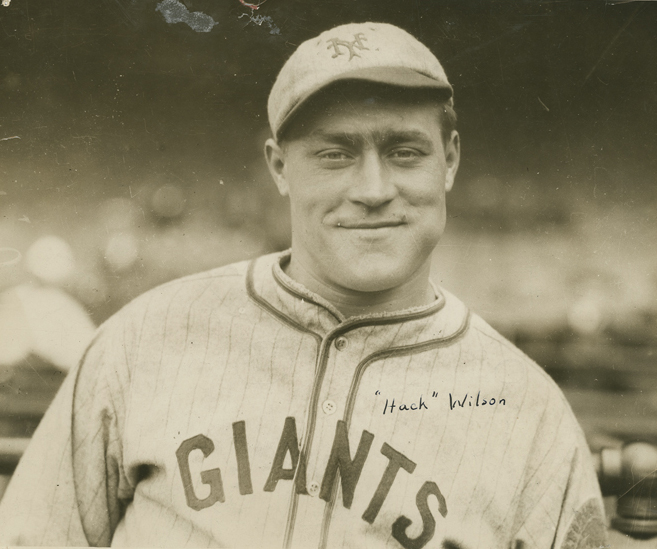Hack Wilson Photo Gallery
Click on any image below to see photos in full size and to start Photo Gallery:

The Sad Demise of Hack Wilson
“Hung over, yes, many times…drunk, no.” -Hack Wilson’s response when asked if he ever played drunk.
“He was built like a beer keg…and was not unfamiliar with its contents!” -Unknown sportswriter, describing Hack Wilson’s physique.
“The Giants just let go to the Cubs the best outfielder I ever played against…and they’re going to regret it.” –Hall-of-Fame outfielder Ross Youngs, speaking of Hack Wilson
Hack Wilson’s demise is among the saddest stories in baseball. Once the highest paid player in the National League, he died penniless and alone on November 23, 1948, probably of alcohol abuse, in a Baltimore hospital. His son, Robert, refused to claim his remains. For a time, he was only identified as a white male. On November 26, National League President Ford Frick claimed his body. Sending a check for $350, Frick paid for Wilson’s services, including the cost of his coffin. At a later date, the Chicago Cubs organized a more fitting memorial. Several former teammates attended, as did thousands of fans. A permanent granite tombstone was placed at his gravesite, giving the baseball legend his proper due.
Here’s a few words about the Hall-of-Fame career of Hack Wilson, edited from one of my earlier posts:
The diminutive Hack Wilson (5′ 6″) was one of the most accomplished power hitters in the game during the late 1920’s and early 1930’s. His 1930 season with the Cubs is widely considered one of the most remarkable individual single-season hitting performances in baseball history. Highlights include 56 home runs (which stood as the National League record for 68 years), .356 batting average, .454 on-base percentage, league-leading .723 slugging percentage, and 191 RBI – a mark which has stood for 74 years and may never be broken. “For a brief span of a few years” wrote a sportswriter of the day, “this hammered down little strongman actually rivaled the mighty Babe Ruth.”
In a 12-year career – undoubtedly cut short by alcohol and a penchant for fighting – Lewis “Hack” Wilson hit for a .307 lifetime batting average with 244 home runs and 1,063 RBI. Wilson led the National League in home runs four times and hit over 100 RBI six times. Although Wilson played on four teams, his finest years were with the Cubs from 1926-31.
In 1925, a front office oversight by the Giants left Wilson unprotected and had allowed Cubs’ president William Veeck, Sr. to “snatch him away” on waivers from the Giants’ minor league affiliate, the Toledo Mud Hens. The Hens’ manager was Jimmy Burke, who tipped his friend, Cub manager Joe McCarthy, that Wilson was unprotected. And just like that, Hack Wilson fell into the Cubs’ laps. It was a mistake McGraw openly acknowledged as one of the worst in his career.
And what a boon he was for the Cubs! Wilson flourished under McCarthy, who knew how to get the best out of his great slugger. McCarthy basically left Wilson alone. As long as Hack continued to be productive, McCarthy, a wise student of psychology, had no problem with him and allowed Wilson to just be himself. As a result, Wilson became one of the most popular and productive players in club history. Fans flocked into Wrigley Field in droves to see the barrel-chested slugger hit. By 1929 the Cubs were in the World Series for the first time since 1918.
Hack’s rapid decline can be traced directly to the time when Joe McCarthy left the Cubs after the 1930 season. Wilson never adjusted to his new manager Rogers Hornsby’s abrasive, controlling style. Hornsby, Wilson, said, “did not allow me to swing away as much as Joe McCarthy did.” After repeated confrontations and a protracted slump, he was benched in late May. Suspension and fines followed after a fight with reporters aboard a train, and he was soon traded away to the Brooklyn Dodgers where his power numbers tailed off dramatically. After a short stint with the Phillies in 1934 he was out of the game.
In later years, the hard-drinking Wilson fell on hard times. He was rejected by his wife and when he died in 1948, his body went unclaimed for two days until the National League paid $350 for his burial and a headstone. Thirty-one years after his death, Hack Wilson was elected to the Baseball Hall of Fame.
-Gary Livacari
Photo Credits: The George Brace Baseball Photo Collection; and public domain.
Information and quotes: Excerpts edited from the Hack Wilson Wikipedia page.
Statistics from the Hack Wilson page on Baseball Reference.
Subscribe to my blog for automatic updates and Free Bonus Reports: “Memorable World Series Moments” and “Gary’s Handy Dandy World Series Reference Guide.”

